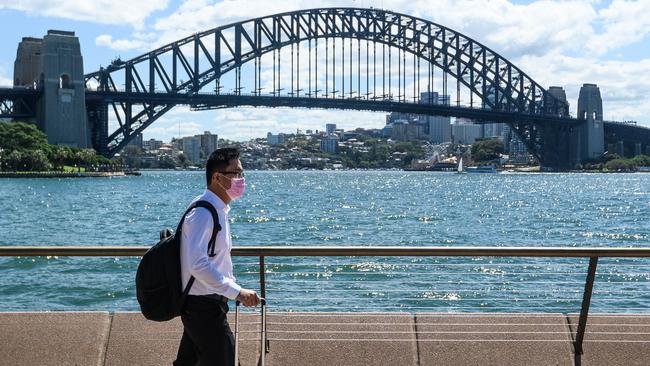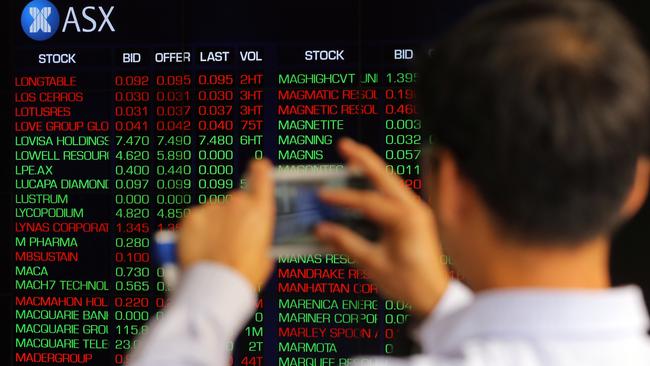COVID-19 fear across Australia makes us feel helpless, but we will survive
Coronavirus may be a dark chapter in our times, but it will not be the final one. We have survived so much else, and we will survive this. Let’s remember that, writes James Morrow.
Rendezview
Don't miss out on the headlines from Rendezview. Followed categories will be added to My News.
We’re all going to die. But you knew that already.
What’s different is how many of us now think that the end will come from the rolling coronavirus pandemic, which in a few short weeks has gone from an esoteric disease which seemingly originated in the unhygienic wet markets of Wuhan to an apocalyptic nightmare that has killed thousands, quarantined nations, and poured a bag of sand into the spinning gears of the global economy.
And even as we take all sorts of measures to prevent our lungs becoming infected by coronavirus, we are being far too cavalier about what it is doing to our brains.
Of course, who wouldn’t be freaked out by the numbers. On Friday it was reported that something like 1.5 million people in NSW might come down with the virus – which even with an optimistic mortality rate of one per cent would still make coronavirus many times more lethal than the things we normally worry about like cancer, heart attacks, and auto-wrecks.
And for those who make it through, which let’s not forget will be the vast majority of people, will be faced with a world of decimated superannuation accounts and diminished economic prospects for some time.
But they will survive, as most likely, will you. Even if in the coming weeks things seem to only get worse and not better. Which is the important point, particularly for anyone who – like yours truly – spends too much time on social media.

The same urge to panic that exists in the physical world, and which leads to deadly stampedes and the like, happens in the virtual world as well, whether it’s the share market or Twitter.
Perhaps because most of us are more than a couple of generations away from war and many of us have not even lived through an economic down-tick, we have an expectation that peace and prosperity are a forever thing, and that the good times can roll forever. But panicking and doom-mongering, whether it means cleaning out the tinned goods aisle to ensure one is part of the select few who survive the coronavirus apocalypse on a diet of Stagg chilli and baked beans or picking up the crisis as a political cudgel, is just a recipe for more disaster.
It’s the reverse side of the same coin which saw, in the early days of the epidemic, China try to hide any bad news of the virus which came out of the mainland – and which today sees Beijing trying to take credit for a successful, if brutally totalitarian, campaign against the virus incubated within its borders.
No, what’s needed is a bit of perspective. The important thing to remember is, we – humanity, civilisation, whatever you want to call it – have been here before.
Although history is barely taught in the schools any more, those who do a bit of reading in their own time will recall that there have been plenty of times when it looked like the curtain was about to be brought down for good. And not just during one of the periodic sackings of Rome (though given the state of things, any hordes storming the city would be hard pressed to find a plate of gnocchi).

In the past century, we have faced the horror of mechanised and chemical death in the First World War, a Great Depression and any number of not-so-great recessions, the attempts by Nazis and communists to overrun the world, and the threat of global nuclear annihilation.
Far too many millions died in the trenches and death camps and gulags, but the essential point remains – society, civilisation, humanity survived, came back, and thrived.
During the Cuban missile crisis of 1962 Americans stripped their supermarkets bare to stock their basement bomb shelters to a degree hard to imagine even in our present paperless toilet moment.
It seemed at the time that the prediction made in British-born Australian novelist Nevil Shute’s classic “On the Beach” of an exchange of nukes in the northern hemisphere that would irradiate the entire planet was finally coming true.
Of course, at the time, any miscalculation by either Kennedy or Kruschev could have led to a far less happy ending.
And today’s virus doesn’t seem to operate according to any rational rules of negotiation, power politics, or game theory.
But while most of us can do little more than take on board the experts’ advice to wash hands relentlessly, wipe down everything, engage (or rather disengage) in social distancing, and so on, we can still choose how we react to this thing.

When Pope John Paul II took office in 1978, at the height of the Cold War when tensions between the superpowers were at their height, he opened his pontificate with the words, “be not afraid”.
A little over a decade later, the Cold War was over and the Berlin Wall being broken up into little hunks of souvenir paperweight.
What’s the point?
We’ve been through scary times before, and we will do so again.
The key is how we choose to react to them.
To return to the spectre of nuclear annihilation, it’s worth remembering these words from CS Lewis (best known for the Narnia books) in 1948:
“This is the first point to be made: and the first action to be taken is to pull ourselves together. If we are all going to be destroyed by an atomic bomb, let that bomb when it comes find us doing sensible and human things — praying, working, teaching, reading, listening to music, bathing the children, playing tennis, chatting to our friends over a pint and a game of darts — not huddled together like frightened sheep and thinking about bombs.”
Lewis went on to add, presciently, “They may break our bodies (a microbe can do that) but they need not dominate our minds.”
Pubs may become problematic and not everyone prays these days, though the distance between players in tennis might make it an ideal sport.
The point is, any of the above activities, which amount to normal life as much as it can be maintained, are far preferable to spending one’s days maniacally driving around town trying to find, and then fight, over bog roll.
James Morrow is the opinion editor for The Daily Telegraph.
Originally published as COVID-19 fear across Australia makes us feel helpless, but we will survive

